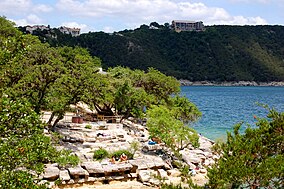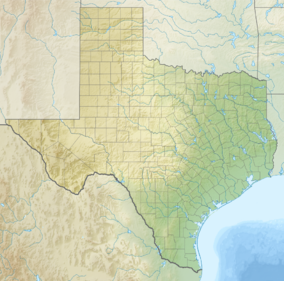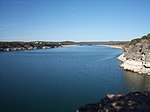Hippie Hollow Park
| Hippie Hollow Park | |
|---|---|
 Hippie Hollow Park | |
| Area | 109 acres (44 ha) |
| Visitors | 350,000[1] (in 2005) |
Hippie Hollow Park (originally known as McGregor County Park) is a park located on the shore of Lake Travis in northwest Austin. It is the only legally recognized clothing-optional public park in the State of Texas.[1] Though the land is owned by the Lower Colorado River Authority, it is leased to Travis County, whose Parks Department has administered the park since 1985. Sometimes erroneously labeled as a beach, the park actually sits on a somewhat steep slope above Lake Travis with limestone steps that can be quite rugged in some spots. Depending on the water level of the lake, access to the water may require some rock climbing.[3]
History
Hippie Hollow Park has been used as a nude swimming spot for years, because the area was along a particularly remote section of the shoreline of Lake Travis. The area became more popular in the 1960s due to the cultural changes of that era, and after Woodstock, the nickname 'Hippie Hollow' was born. Hippie Hollow was controversial in the 1970s, due to increased skinny-dipping which generated complaints from adjacent landowners. Raymond Frank, the sheriff of Travis County from 1973–1980, determined that the county's law enforcement budget was better spent on more serious offenses, and skinny-dipping activities were generally ignored as long as no other laws were being broken.
In October 1983 the park site was leased to Travis County, and in October 1985 Hippie Hollow Park opened to visitors after some modest improvements and an extensive site clean-up by the county, replacing the former name of McGregor Park. The park continues as a clothing optional park, with appropriate signage at the park entrance advising visitors that nude swimming and sunbathing may be encountered. At one time the park was frequented by families, but many objected. First the environmentalists had pets banned, using the argument that they interfered with the local wildlife. Then the preachers stepped in, and on July 11, 1995 the county commissioners passed an ordinance restricting park usage to those over 18 years of age, as a result of Travis County Attorney Ken Oden's interpretation of nudity laws.[4][5]
This ordinance was challenged in court by the Central Texas Nudists headed by Bob and Christine Morton, who, along with other naturist families, had been bringing their children to the site for years without incident. Part of Morton's argument was that the Texas Hill Country had been settled by many German and Czech immigrants in the middle-19th century, and nude sunbathing had been a part of their culture. An appeals court ruled in favor of the county in 1999, and the U.S. Supreme Court refused to hear the case (Central Texas Nudists vs. Travis County) in October 2001.[6] Hippie Hollow remains clothing optional, but with park usage restricted to those over 18. The name McGregor park has been restored, officially, but few call it that.
Events
Austin's gay and lesbian community sponsors Splash Day on the first Sundays of May and September every year, drawing large crowds of visitors which have occasionally exceeded park capacity. These high-publicity events have given the park the reputation as being popular with gay sunbathers. On other warm, sunny weekends, the park is populated by both clothed and unclothed people of both sexes, with a demographic mix that is comparable to that of the surrounding region. Like most parks, weekend usage is much heavier than on weekdays.
See also
References
- ^ a b Template:Wayback.
- ^ "Hippie Hollow Park". Geographic Names Information System. United States Geological Survey, United States Department of the Interior. Retrieved 2016-03-11.
- ^ "Hippie Hollow Park". Lower Colorado River Authority. Retrieved 2010-07-22..
- ^ Austin American-Statesman, July 12, 1995, pg B-1
- ^ Victoria Advocate, July 12, 1995, pg 3
- ^ "Texas Court of Appeals case No. 03-00-00024-CV". Retrieved 2009-09-20.


